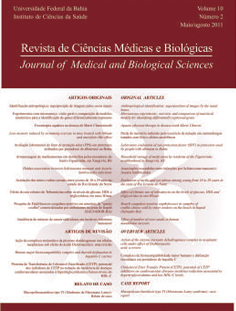Human major histocompatibility complex and thyroid dysfunction in hepatitis C carries
DOI :
https://doi.org/10.9771/cmbio.v10i2.4825Mots-clés :
Major histocompatibility complex. Hepatitis C. Interferon-alpha. Thyroid dysfunction. Autoimmunity.Résumé
The major histocompatibility complex (MHC) is a multigene family of receptors which are crucial in antigen presentation, mediation, and initiation of the cellular immune response. An association exists between certain MHC polymorphisms and autoimmune thyroid disease in animals and humans. Hepatitis C virus (HCV) infection has been shown to be associated with increased incidence of thyroid dysfunction, moreover, interferon-á (IFN-á) therapy of chronic HCV infection is associated with the thyroid dysfunction. IFN-á has been the basis for the treatment of HCV infection has been identified as an immunomodulatory cytokine that induces T-lymphocyte activation and expression of MHC molecules. Becomes evident therefore that the MHC- class I and MHC- class II antigens are central to the host immune response and thus are ideal candidate genes to investigate for associations with HCV infection. Autoimmune thyroid diseases are characterized by increased, rather than decreased expression, of MHC- class II antigen. Furthermore, work in animals suggests that the increased production of thyroid antibody and expression of MHC- class I and MHC- class II antigen are associated. This study will address the relation between MHC and thyroid dysfunction in HCV infection carries.Téléchargements
Les données relatives au téléchargement ne sont pas encore disponibles.
Téléchargements
Publiée
2011-12-07
Comment citer
de Oliveira Andrade, L. J., Santana de Melo, P. R., Santos França, L., Santos França, L., Andrade Malta, A. M., & Paraná, R. (2011). Human major histocompatibility complex and thyroid dysfunction in hepatitis C carries. Revista De Ciências Médicas E Biológicas, 10(2), 179–186. https://doi.org/10.9771/cmbio.v10i2.4825
Numéro
Rubrique
Artigos de revisão
Licence
A Revista de Ciências Médicas e Biológicas reserva-se todos os direitos autorais dos trabalhos publicados, inclusive de tradução, permitindo, entretanto, a sua posterior reprodução como transcrição, com a devida citação de fonte. O periódico tem acesso livre e gratuito.






